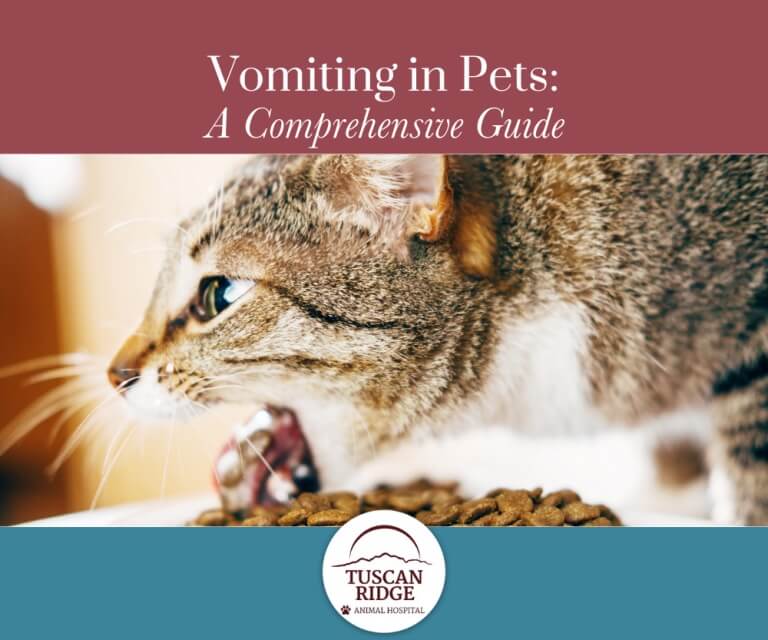 Vomiting pets can be distressing for both the animal and its owner. It’s a common medical problem that can result from a variety of factors, ranging from benign to serious medical conditions.
Vomiting pets can be distressing for both the animal and its owner. It’s a common medical problem that can result from a variety of factors, ranging from benign to serious medical conditions.
At Tuscan Ridge Animal Hospital, we aim to provide you with the knowledge and support needed to understand and manage this condition in your beloved pet. This blog post will explore the potential causes, symptoms, and treatments of vomiting in pets, along with a comprehensive Q&A section to address common concerns.
Causes of Vomiting in Pets
Vomiting can be caused by numerous factors, including:
- Dietary Indiscretion: Pets often ingest things they shouldn’t, such as garbage, toxic plants, or spoiled food, leading to gastrointestinal upset.
- Infections: Bacterial, viral, or parasitic infections can cause vomiting. Common culprits include parvovirus in dogs and panleukopenia in cats.
- Dietary Sensitivities: Some pets may develop sensitivities or allergies to certain foods or ingredients.
- Toxins, onion), household chemicals, or plants can cause severe vomiting.
- Medications: Some medications can induce vomiting as a side effect.
- Foreign Objects: Pets, especially dogs, may swallow non-food items like toys, bones, or clothing, which can obstruct the gastrointestinal tract.
- Systemic Diseases: Conditions like kidney disease, liver disease, pancreatitis, or Addison’s disease can lead to vomiting.
- Motion Sickness: Some pets experience motion sickness during car rides or other forms of travel.
Symptoms to Watch For
While occasional vomiting might not be a cause for alarm, persistent or severe symptoms warrant veterinary attention. Watch for:
- Repeated vomiting
- Blood in vomit
- Lethargy or weakness
- Loss of appetite
- Dehydration
- Diarrhea
- Abdominal pain or bloating
- Weight loss
Diagnosing Vomiting in Pets
When you bring your pet to Tuscan Ridge Animal Hospital, our veterinarians will perform a thorough examination and may recommend diagnostic tests such as:
- Blood tests
- Fecal examination
- X-rays or ultrasound
- Endoscopy
- Dietary trials
These tests help identify the underlying cause and guide appropriate treatment.
Treatment Options
Treatment for vomiting depends on the underlying cause. Some common treatments include:
- Dietary Management: Switching to a bland diet or hypoallergenic food.
- Medications: Anti-nausea drugs, antibiotics, or other medications as needed.
- Hydration Therapy: Intravenous or subcutaneous fluids to combat dehydration.
- Surgery: In cases of foreign object ingestion or severe gastrointestinal disease.
- Lifestyle Changes: Managing motion sickness or preventing access to harmful substances.
Preventing Vomiting in Pets
Prevention is always better than cure. Here are some tips to help prevent vomiting:
- Feed a balanced and appropriate diet.
- Avoid sudden changes in diet.
- Keep toxic substances out of reach.
- Supervise pets during playtime to prevent ingestion of foreign objects.
- Regular veterinary check-ups to catch and manage health issues early.
Q&A Section
Q1: What should I do if my pet vomits once but seems fine otherwise?
A1: If your pet vomits once and appears otherwise healthy, it may not be a cause for concern. Monitor them closely for any additional symptoms. If vomiting persists or other symptoms develop, contact your veterinarian.
Q2: When should I take my pet to the vet for vomiting?
A2: Seek veterinary attention if your pet is vomiting frequently, shows signs of lethargy, blood in vomit, dehydration, abdominal pain, or if the vomiting persists for more than 24 hours.
Q3: Can I give my pet over-the-counter medications for vomiting?
A3: It’s essential to consult your veterinarian before giving any medications. Some human medications can be toxic to pets.
Q4: How can I prevent my pet from eating harmful substances?
A4: Keep household chemicals, plants, and certain human foods out of reach. Supervise your pet during playtime and provide safe, pet-appropriate toys.
Q5: Is vomiting always a sign of a serious condition?
A5: Not necessarily. Occasional vomiting can be due to minor issues like dietary indiscretion. However, persistent or severe vomiting can indicate a serious health problem and requires veterinary evaluation.
Q6: What should I feed my pet after they have vomited?
A6: After vomiting, it’s best to withhold food for a few hours to let their stomach settle. Then, offer small amounts of bland food such as boiled chicken and rice. Gradually reintroduce their regular diet as they recover.
Q7: Can stress cause vomiting in pets?
A7: Yes, stress can cause vomiting in pets. Situations like moving to a new home, changes in routine, or separation anxiety can lead to gastrointestinal upset.
Q8: Are certain breeds more prone to vomiting?
A8: Some breeds may be more prone to conditions that cause vomiting. For instance, breeds with deep chests like Great Danes are more susceptible to bloat, which can cause vomiting.
Conclusion
Vomiting in pets can be alarming, but understanding the potential causes and treatments can help you manage the situation effectively. At Tuscan Ridge Animal Hospital, we’re here to provide the care and guidance you need to keep your pet healthy and happy. If you have any concerns about your pet’s vomiting, don’t hesitate to contact us for expert advice and treatment.
By staying informed and proactive, you can ensure that your pet receives the best care possible. Remember, early intervention is key to addressing any health issue. Our team at Tuscan Ridge Animal Hospital is dedicated to supporting you and your furry friends through every step of their health journey.
